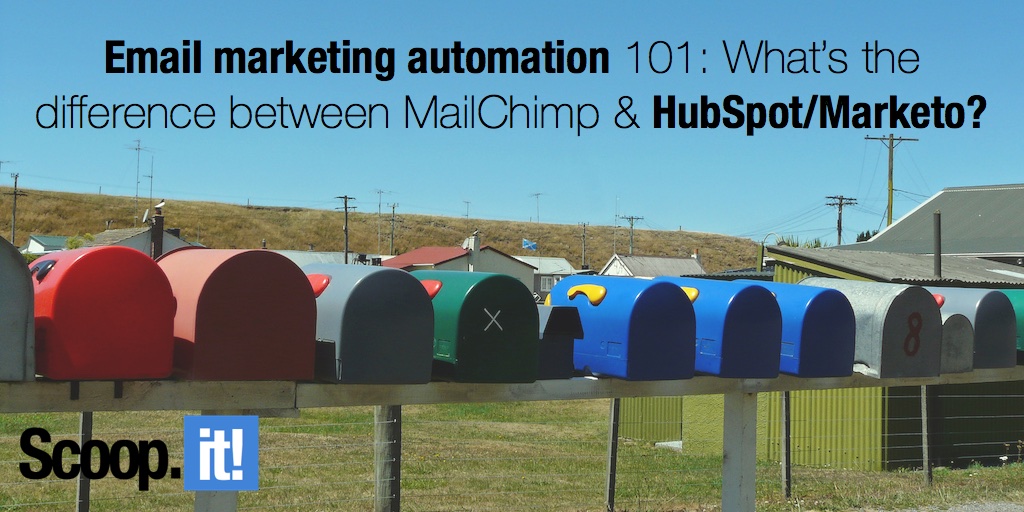
You may be skeptical, but businesses should still be using email marketing to win new customers and maintain relationships with current customers. Email may seem like an oversaturated communication channel today, but email campaigns still nurture leads, increase sales, and convert customers 3x more than social media. It’s a no brainer.
Though it’s incredibly useful, email marketing can be a time consuming and difficult task to accomplish, especially as your business grows. Some find the task daunting and resort to hiring an independent developer or a full-time employee to take over the process. However, there are some great tools that can help everyone, no matter what their level is.
Getting started with email marketing automation
Enter email marketing automation, which takes care of the grunt work of your email campaigns for you. But there are a number of services to choose from, so how do you know which is right for your business?
There are 2 types of services to consider:
- Email marketing automation software like MailChimp
- General, more comprehensive marketing automation software like HubSpot and Marketo.
Similarities:
- ability to set up automated email campaigns with tailored content and customized templates
- use email as the main point of contact with leads
- offer some degree of analytics to track success
But the similarities end there.
MailChimp focuses exclusively on email marketing automation, whereas HubSpot and Marketo offer much more robust services that allow users to not only automate email, but to also:
- build landing pages
- manage social media accounts
- offer more in-depth analytics
Determine your budget
From this brief overview of the two types of email marketing automation platforms, why wouldn’t you just go with the complete marketing automation software that has all the built-in bells and whistles? The biggest issue is obvious: cost.
HubSpot costs $200 per month and that is only for 100 contacts and basic features, which simply isn’t enough for most businesses. From there, prices escalate steeply. Similar services are comparably expensive. For example, Marketo costs $895 up front for its simplest contract- which also locks businesses into a year-long plan.
Compared to those hurdles of budget and commitment, a service like MailChimp seems much more appealing. MailChimp is free for its first 2000 followers, and pricing then begins at $20 per month. As you can see, the price difference is dramatic. But price doesn’t tell the whole story and shouldn’t be the only reason you choose one service over another. So let’s dive into capabilities:
1. Customization and integration
Given its price point, MailChimp is a great inexpensive tool for SMBs that need email automation. It offers a drag-and-drop design tool to help you craft your emails and offers a wide variety of templates, which are customizations that HubSpot and Marketo lack. You can even design your own template if you want to.
MailChimp also offers hundreds of third party integrations, compared to HubSpot’s 47 native integrations and Marketo’s 45+. If you have software that you are already using and like, MailChimp is the easiest option to add to your existing set-up.
2. Data-tracking and analytics
On the flip side, if you’re looking to revamp your entire marketing software, then you need to be considering a fully-fledged tool like HubSpot or Marketo. Both tools can be used by entire teams effectively and track every customer interaction that businesses have online, whereas MailChimp only tracks data related to email campaigns. As a result, these tools provide lead scoring, so if your business needs to sort and organize leads, you’d be better off with one of these services.
Another important distinction is that HubSpot and Marketo offer real-time reports and analytics whereas MailChimp does not. If real-time updates will positively impact your business, then MailChimp likely isn’t for you.
3. IP Strength
What MailChimp has that HubSpot and Marketo lack is high ranking IP addresses. MailChimp rigorously protects its shared IP addresses through its abuse-prevention software Omnivore to make sure users don’t spam. As a result, emails sent through their service rarely end up in a user’s spam folder. HubSpot has weaker IP addresses, but they are still usable. Marketo, on the other hand, has no measures in place to protect their IP, so if you use this tool for email campaigns, you’ll need to send emails from your own IP. This isn’t inherently bad, but it is another step in the process.
Conclusion
Ultimately, what tool you use depends on your business as each has their respective pros and cons. MailChimp is the best option for small businesses looking to add email marketing automation to their existing setup, whereas HubSpot and Marketo are best for businesses looking for new software to track lead behavior and sort potential customers into different pipelines.
With an early investment in the right marketing automation tool for your business, you will soon see your sales increasing at a steady rate. What’s even better is that you’ll free up your own time to work on other areas of your business.
If you want a whole set of tips to generate leads with content marketing such as ways to repurpose your content into other forms, insights on which format you should focus on, techniques to measure the results and other data points, download the eBook “How to generate leads through Content Marketing“.
Image by Jane Nearing.



 (6 votes, average: 4.83 out of 5)
(6 votes, average: 4.83 out of 5)